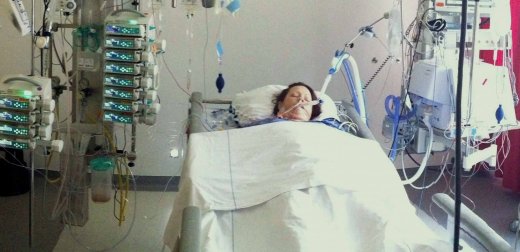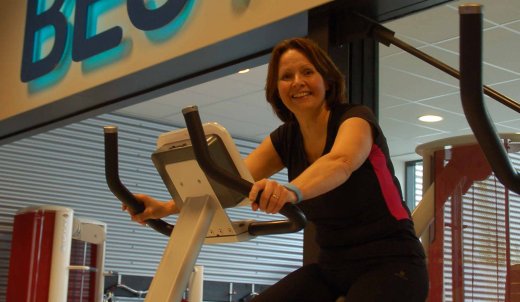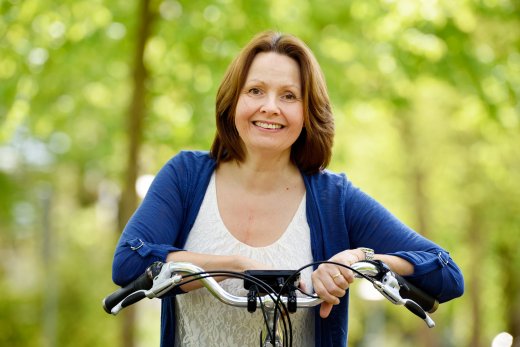29/05/2017
Personal Stories: Paula
If you looked at me a few years ago, you would have seen a strong and fit middle-aged woman. I have one passion: sports, especially mountaineering. If it was up to me, I would be in the mountains twenty-four-seven. I have always wanted to be a strong and independent woman, who is capable of everything. I was the one people would contact if they wanted a tree to be cut down. I always push myself to the limit and strive to go beyond.
If you look at me now, outsiders still see the same Paula. A middle-aged woman with two children and a husband, who still looks quite fit. However, I am not the same anymore. Inside I have an invisible disability that affects me and numerous other people: heart failure.

The small changes
It all started three years ago. When everything still seemed normal. I often hiked with my children, but during our most recent journeys I could not keep up with them. Over time children grow stronger than their parents, so this was completely normal, wasn't it? And while cycling to my new job, at a child daycare, my legs felt heavy. It was probably all caused by the menopause, wasn't it? Soon after my job transition, I got a heavy cold, but it was probably just caused by all the sneezing and coughing children, wasn't it?
In October 2014, it became clear that all these symptoms were not as normal as I had thought. On a night like any other, I went to bed early because I felt very tired. Then a sudden heart infarction happened. My husband heard me calling his name while he was still downstairs. He immediately called an ambulance and I was rushed to the hospital. At midnight I had a open heart surgery. I remained in a critical condition for three days long, and in total I spent a week in a coma.
Reaction and rehabilitation
When I woke up, I could not remember anything. I did not realize the gravity of the situation I was in. The first thing I asked was: 'When can I start climbing again?'. They told me I should leave that to the next generation. I did not believe them and I convinced myself I would get better and healthy again. The doctors and nurses just did not understand what kind of person I was. I would show them what I am capable of. I kept working hard on my rehabilitation in the hospital and after five weeks I could go home. It turned out, however, that I would never be able to recover completely. I had lost two-thirds of my heart function.

My new life
There are a lot of restrictions in my new life. Firstly, I need to very carefully plan which activities I will spend my energy on, as I get tired very quickly. Doing an activity can mean I have to rest for a few days afterwards. I spend the main part of my energy on exercising, because otherwise my condition and health will worsen. I fight my tiredness, work as hard as I physically can, and try to reach my limits, which means that I sometimes get to the point of almost throwing up from pure exhaustion.
The second thing that drastically changed is my self-management skills in particular as pertaining to my diet. I can only consume 1500 ml of liquid each day, as more fluid consumption causes a higher blood volume, which causes that my heart needs to work too hard. This 1500 ml limit includes liquid from fruit, salads, yoghurt and any other type of food with fluids. Salty and greasy foods are also not allowed. These heavy restrictions can only be maintained by intense self-management and a disciplined lifestyle.
Another aspect that has changed and had a big impact on me is my cognitive loss. This is the hardest change to deal with, because people cannot see it from the outside. As a heart patient, my heart isn't able to work as well as before. This influences both my physical and mental capabilities. This is partly due to the lack of oxygen my brain received during the heart infarction itself. I used to study mathematics and I was quite smart, but now I cannot even follow some of my children's narrations about university.
I also cannot remember things as well as I used to. There is definitely a loss in my cognitive capabilities, but I still have enough to go through daily life. The loss I suffer from can, however, not be seen from the outside nor understood by others, which makes it hard to accept.

Acceptance
The hardest part of this whole ordeal is accepting the changesand dealing with other people. I am no longer capable of all the things I used to do, and the fact that people cannot see this from the outside makes it very difficult. A man at the gym once said to me : 'you are so fit, why are you even here?'. He was trying to make a joke, but I absolutely could not take it like one. I explained to him that though he can not see it, I have the stamina of a frail eighty year old.
Another example is my insecurity while traveling with public transport. I simply do not dare to ask for a seat when a bus or train is full, because many people think I am a healthy woman. Do I have to explain my situation every time over and over again? Will they take me seriously while I look healthy?
I have already come a long way in terms of acceptance, but I still have to learn to accept much more. Some things are just too difficult to accept in such a short time, but luckily I have my family to support me.
Looking to the future
It is very hard to accept that my future is not so bright. My heart has less than a third of the capabilities of a normal heart. I always used to say that I would live past a hundred, but I am now left to hope that I will reach the age of eighty. My future lies in me accepting this, and dealing with it in the most positive way I possibly can. There is unfortunately no hope for full recovery. My strict discipline and self-management only prevent my condition from getting worse. The hard truth is that the only certainty I have is that my heart and health will eventually decline.
I, however, refuse to just wait and do nothing. I still have my willpower and I want to stay completely self sufficient. I will continue pushing myself to the limit, to experience what I am and am not capable of. And I do get punished by my body. I could avoid this and choose to follow the easy road, but that is simply not the way I want it to go.
Role of biosensors
A biosensor would help people to better monitor themselves and to improve their self-management. It could also help me with a better division of energy throughout the week. The major difficulty of heart failure is that you cannot see any symptoms. The only indicator we have is our weighing scale. Therefore, if you do not feel well, you often cannot explain it. A biosensor would give me and other patients that extra information, in order to explain and maybe prevent some events. The unpredictability is the most difficult aspect of my disease and a biosensor would be a real help for managing that.
I really think self-management is the key for preventing any other hospitalization and a further decline of the heart. In order to have good self-management, information about your own body obtained by a biosensor is essential. I hope a biosensor can therefore stimulate better self-management, not just for me, but for everybody.
SensUs is, in my opinion, a great initiative and I am a fierce supporter of science. Due to science, healthcare has improved a lot. I cannot even imagine what would have happened if I had gotten my heart infarction fifty years ago. Science makes devices like biosensors a reality. I am always open for new technologies and if there will be a working biosensor at the end of the competition, I want to be the first one to try it!


Facebook
YouTube
LinkedIn
Instagram